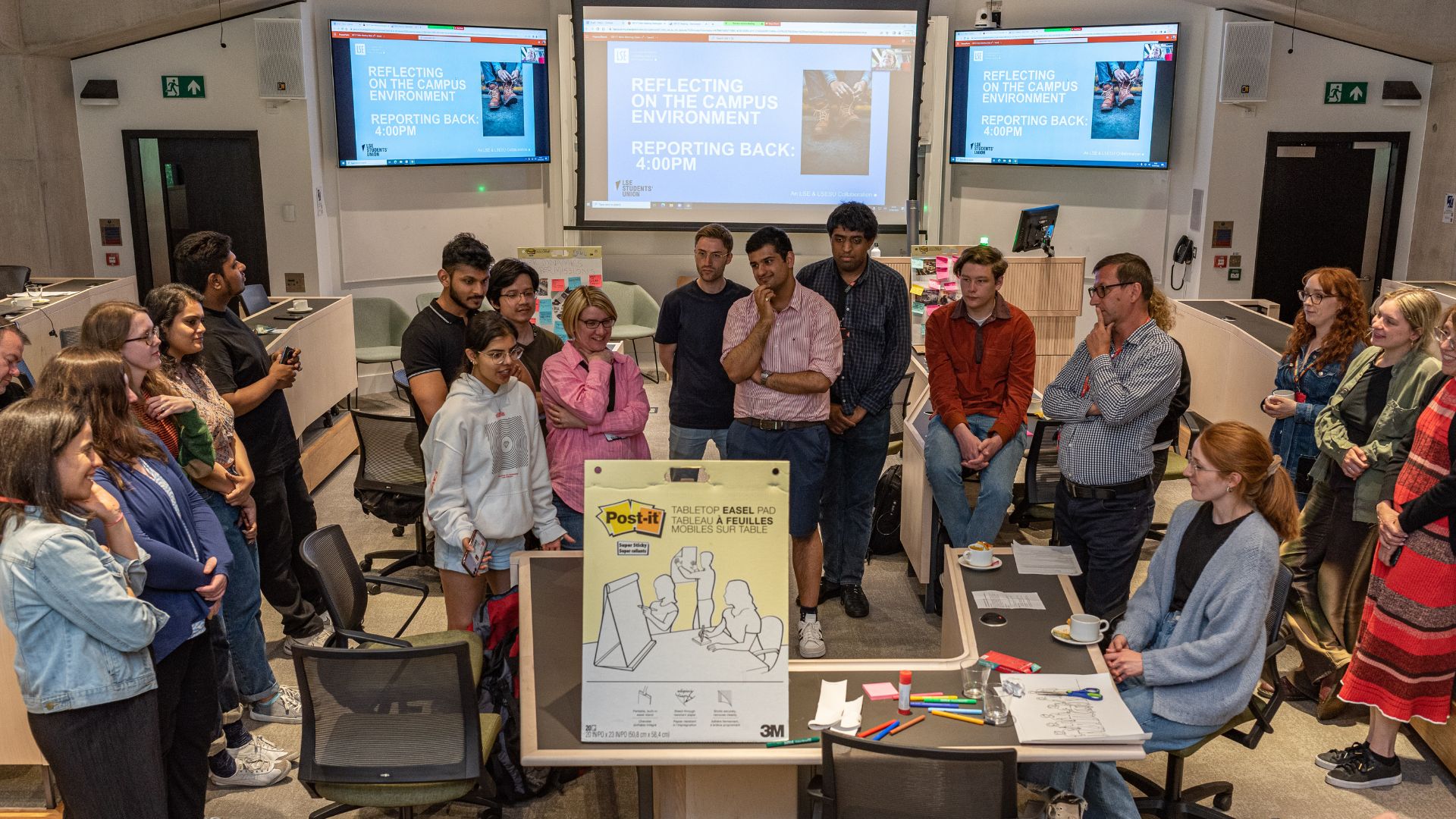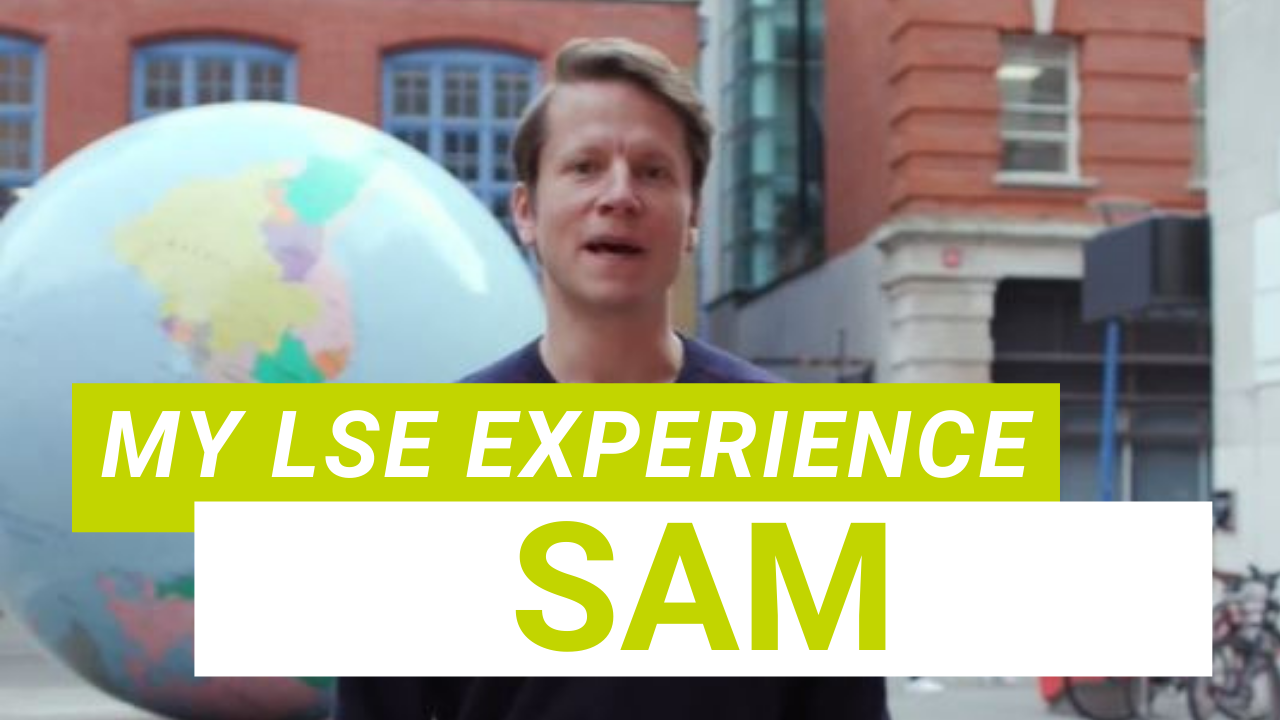
The Student Education Panel engages students of all backgrounds in the development of education at LSE. 50 Student Education Panellists meet three times per year to discuss a specific education-related topic, question or proposal. Drawing on their own experiences and ideas, they provide an all-important student perspective in current conversations about education at LSE, with a view to developing a better educational experience that works for all our students.
Panellists are a group of diverse individuals who reflect on their personal experiences and perspectives, and do not participate as a representative of their peers. They also play a key role in shaping how the Student Education Panel develops accross the year and beyond. The opinions, ideas and solutions exchanged during panel meetings will be considered alongside other channels for student input, including Student Staff Liaison Committees, Consultative Fora, LSESU representation and Change Makers research.
Hear from Sam, a previous Student Education Panellist, about his experience on the panel:

The Student Education Panel is composed of up to 50 students: undergraduate, General Course, taught postgraduate and research.
We welcome participation from any registered student who is interested in the design and delivery of their education and believes they could bring a different perspective to the conversation. There are no prerequisites for this role.
We are particularly looking to engage students who may feel less heard through LSE’s existing student partnership and student voice opportunities.
Each Student Education Panel meeting will have a different high-level topic, chosen and faciliated by senior staff from accross LSE and LSESU.
You can see the topics from previous meetings at Insights from the Student Education Panel.
The Student Education Panel has been designed to offer panellists the following benefits and opportunities:
- Engage as a partner in education enhancement by building mutually beneficial relationships with other students and staff.
- Contribute to real changes at LSE by sharing your experiences, advising on proposals, co-creating new ideas, and collaborating on solutions.
- Develop your skills and insights as an independent thinker, critical investigator and thought-leader.
- Become part of a community of panelists from across the School who share your commitment to improving the student experience.
- Interrogate and increase your understanding of the university as an idea and an institution.
All panellists will be remunerated for the time spent preparing for, and attending, Student Education Panel meetings. This is to ensure equitable access to opportunities and to recognise their labour and contributions to improving LSE. Panellists will receive a £30 voucher per meeting, that can be redeemed from a variety of retailers.
There will be three in-person panel meetings each academic year, each one lasting for approximately 90 minutes. Every meeting will have a different overarching topic/theme and will be facilitated by staff from LSE and LSESU.
Panellists will hear about current strategic priorities within LSE and LSESU and interrogate their understanding, expectations, and experiences of higher education. The main part of the panel discussions, on the given topic/theme, will take place in small groups, who will then feed back to the rest of the panel. Examples of activities given to panellists could include:
- Assess an aspect of LSE’s current education offering
- Identify priority areas for change
- Propose solutions to known issues
- Share examples of good practice from across the sector
- Co-create resources for staff development.
Student Education Panellists are expected to prepare for, attend, and actively contribute to three Wednesday afternoon panel meetings across Autumn and Winter Terms.
They are also expected to take an active role in the development of the panel, by contributing to short planning and evaluation activities outside of each main meeting.
If a timetabled lecture/class/seminar prevents you from participating in one of the panel meetings or activities, please discuss this with panel organisers in advance. We will endeavour to identify alternative ways of making your contribution, if appropriate.
Between the compulsory main panel meetings, panellists will also be offered exclusive opportunities to contribute to university developments through optional sub-panel meetings. These include activities such as:
- Forming a student discussion panel as part of the LSE Education Fora and Symposia events for staff
- Collaborating with School-level working groups on relevant topics
- Contributing to the development of new policies and procedures
- Preparing posters and/or papers for presentation at external education-focussed conferences
- Research Assistant positions within the Eden Centre
Previous panellists have told us how much they enjoyed the experience to engage directly with staff during these smaller-group opportunities.
After each main meeting, a summary of each meeting will be prepared and presented to relevant stakeholders, as well as reported to the Student Experience Sub-Committee (a key part of LSE's governance structure).
The information gained from panel meetings are used, in conjunction with feedback from Student Staff Liaison Committees, LSESU representation and Change Makers research, to enhance students’ experience of education at LSE.
LSE has a variety of opportunities for students to share their university experience.
The Student Education Panel differs from Academic Representatives because panelists reflect on questions as individual students, and their feedback is not taken as representative of their peers. Student Education Panelists consider a pre-defined strategic topic in detail, whereas Academic Representatives typically provide feedback on their experiences more generally.
Similarly, Panelists do not conduct in-depth original research like the Change Makers, although they may engage with Change Makers findings and recommendations from previous years.
Your application will be reviewed and you will be notified of the outcome no later than the end of November 2024.
If you have been selected to join the Student Education Panel, you will then be sent a list of meeting dates and topics. All meetings will be held on Wednesday afternoons, to minimise the chances of a clash with teaching.
You will be a part of the Student Education Panel for one academic year, until the end of June 2025.
